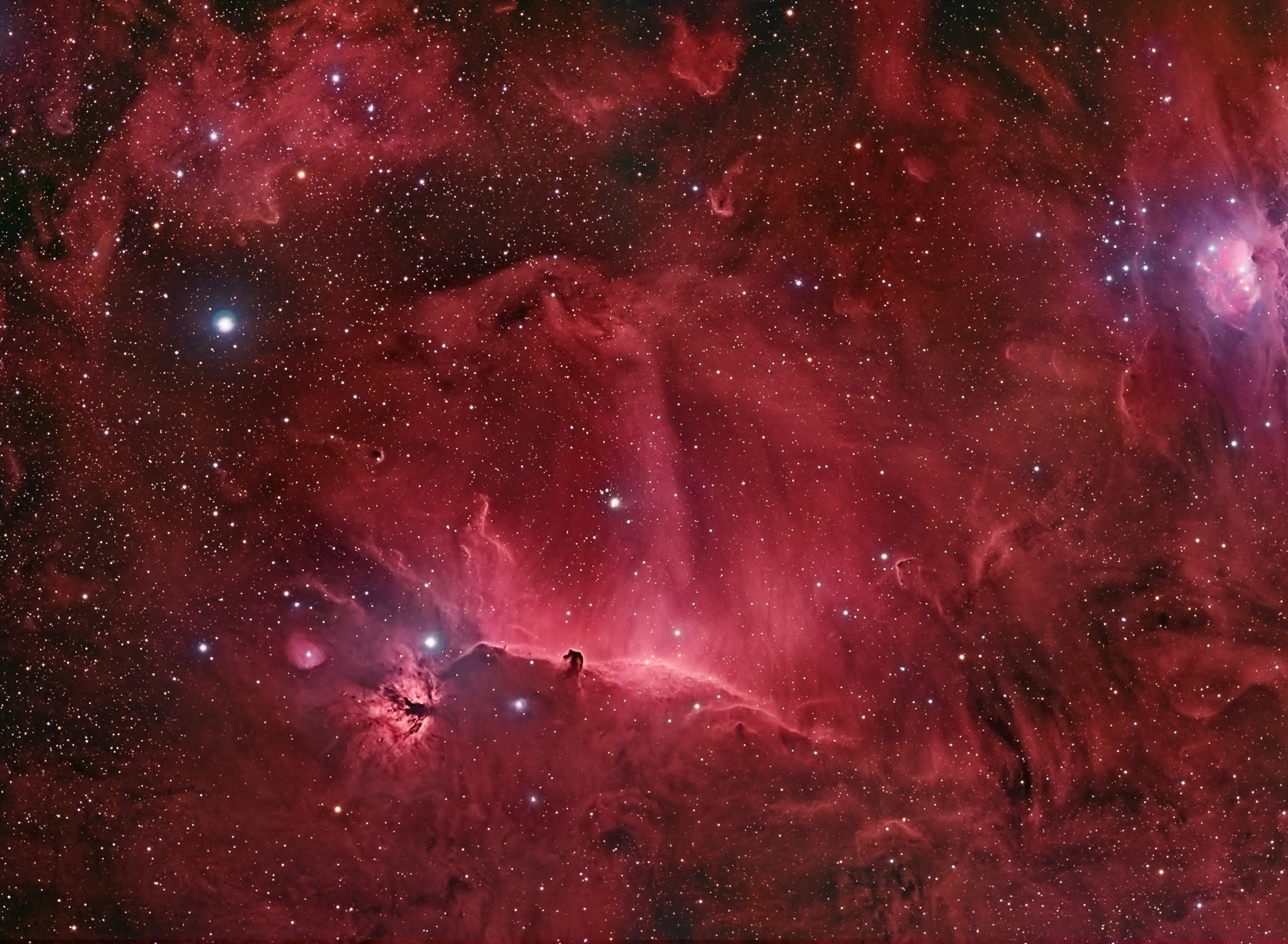This week the waxing moon journeys across Taurus and Gemini. As it does, it encounters the Pleiades, the small but distinctive cluster of stars in Taurus also known as "the Seven Sisters." On the evening of January 17th, the moon will graze through this region of the sky in what is called an "occultation" of the Pleiades. Occultations are special times when a celestial object is "blocked" from our point of view by another object. The most common are occultations of stars and planets by the moon. When this is being caused by the moon, it affords anyone with binoculars or a telescope to easily observe the motion of the moon against the background stars as the moon makes its monthly journey around the earth. On the evening of January 17th as the moon variously covers and uncovers stars in the Pleiades, you will be able to sense that motion. Over the course of approximately three hours the moon will move across the Pleiades.
Two days later, the nearly full moon will pass very close to Mars but will not occult the planet from our vantage point in San Francisco. Observers much further north (in Canada) will in fact see the moon completely cover Mars. Because Mars is bright and fairly close to earth right now, the sight of it so close to the full moon will be quite beautiful. Take a few moments on the evening of January 19th to enjoy this spectacle. I observed a similar lineup of moon and Mars in December during the previous full moon two days before Christmas.
Earlier this month I was a guest on the KFOG radio morning show (104.5 FM in San Francisco). KFOG features the best morning show program in the San Francisco Bay Area (in my humble opinion) because the DJ and his crew talk about relevant subjects and current news items in an intelligent way. I thought it would be interesting for the KFOG listeners, affectionately known as Fogheads, to hear about astronomy and I asked to be a guest on the program. Morning show producer Greg McQuaid welcomed me to join and on January 8th I was a guest. The program went well and the Fogheads asked interesting questions. I am invited to return to the morning show in March and will post an update to the blog when the date is confirmed.
There were many more questions from Fogheads that we did not get to answer during the show, so I will post them to this blog from time to time.
14 January 2008
08 January 2008
05 January 2008
Astronomy Resources
The web is filled with excellent astronomy resources. Here are some of the sites I frequent for different kinds of information.
Visit daily: Astronomy Picture of the Day
Photos and Images: NASA has a wealth of photos from all of its missions.
Eclipses: the authority on all things related to eclipses: Fred Espenak's NASA site
Good for listening: StarDate is a quick daily dose of very general astronomy topics. Astronomy Cast is an excellent weekly podcast for those looking for deeper insights.
General Resources: Sky and Telescope Magazine or Astronomy Magazine are very good portals covering many aspects of astronomy for the amateur and hobbyist. Spaceweather.com has very useful up-to-date information and news about the goings-on in space.
Sun and Sky Conditions: The Clear Sky Clock provides a wealth of detail on sky conditions with details on transparency, darkness, seeing, and so on. The US Naval Observatory provides exact sunrise and sunset times anywhere on the globe.
Clubs: San Francisco Amateur Astronomers have a range of activities and resources if you want to get more involved in astronomy.
Visit daily: Astronomy Picture of the Day
Photos and Images: NASA has a wealth of photos from all of its missions.
Eclipses: the authority on all things related to eclipses: Fred Espenak's NASA site
Good for listening: StarDate is a quick daily dose of very general astronomy topics. Astronomy Cast is an excellent weekly podcast for those looking for deeper insights.
General Resources: Sky and Telescope Magazine or Astronomy Magazine are very good portals covering many aspects of astronomy for the amateur and hobbyist. Spaceweather.com has very useful up-to-date information and news about the goings-on in space.
Sun and Sky Conditions: The Clear Sky Clock provides a wealth of detail on sky conditions with details on transparency, darkness, seeing, and so on. The US Naval Observatory provides exact sunrise and sunset times anywhere on the globe.
Clubs: San Francisco Amateur Astronomers have a range of activities and resources if you want to get more involved in astronomy.
Subscribe to:
Comments (Atom)




